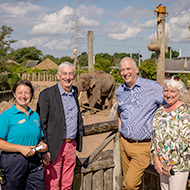
Sir Lindsay Hoyle heard about the zoo's conservation work.
The Speaker of the House of Commons, Sir Lindsay Hoyle, was invited to Chester Zoo to learn more about its role in conservation.
Meeting with the zoo's keepers, deforestation team and CEO, the Speaker learnt about the work the zoo is carrying out to develop a safe and working vaccine against elephant endotheliotropic herpesvirus (EEHV).
EEHV is a disease which is a huge threat to the future of Asian elephants, and is currently spreading in India, Nepal, Myanmar, Sri Lanka, Cambodia, Laos, Indonesia and Thailand. It has also caused the death of young Asian elephants in zoos, including at Chester Zoo itself.
At Chester Zoo, in partnership with virology experts at Surrey University, scientists are currently undertaking the world's first trial of a potential vaccine for EEHV.
The Speaker also heard about the field work done by the zoo, and he was given the opportunity to view the behind-the-scenes conservation facilities where Bermuda snails are being bred and released back into Bermuda, having previously been thought to be extinct.
Discussing his experience at the zoo, Sir Hoyle said: “What a pleasure it was to visit Chester Zoo - a conservation powerhouse.
“I have been so impressed by the huge amount of vital conservation and science work being done in the North West.
“From working to save the mighty Asian elephant from extinction by developing a vaccine for them to re-introducing thousands of tiny Bermuda snails into the wild, Chester Zoo is playing a critical role in preventing wildlife extinction both here in the UK and worldwide.”
Also mentioned was the zoo's efforts to combat deforestation via the promotion of sustainable palm oil use.
Mr Speaker heard about Chester Zoo's 'Sustainable Palm Oil Communities' project, which provides resources and guidances to business and organisations on deforestation-free palm oil sources.
The Speaker continued: “As an animal lover myself, I am proud a British zoo is leading the way with this ground-breaking conservation work at such a critical time for our planet, and what I have seen today really highlights the important role our zoos play in preventing extinction and protecting our planet.”
Image (C) The Office of the Speaker



 The Veterinary Medicines Directorate (VMD) is inviting applications from veterinary students to attend a one-week extramural studies (EMS) placement in July 2026.
The Veterinary Medicines Directorate (VMD) is inviting applications from veterinary students to attend a one-week extramural studies (EMS) placement in July 2026.